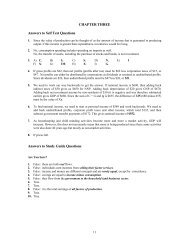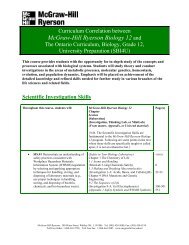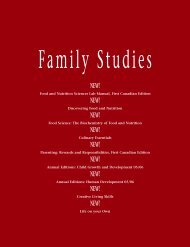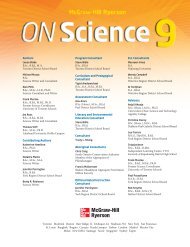Ultranationalism and Crimes against Humanity - McGraw-Hill Ryerson
Ultranationalism and Crimes against Humanity - McGraw-Hill Ryerson
Ultranationalism and Crimes against Humanity - McGraw-Hill Ryerson
Create successful ePaper yourself
Turn your PDF publications into a flip-book with our unique Google optimized e-Paper software.
10<br />
1100110010011<br />
0010011001001101001<br />
10010011001001100100110<br />
01001 100100110010011001001<br />
10010011001001100100110010<br />
To find out the<br />
0110010011001001100100110010<br />
latest developments at<br />
01100100110010011001001100100<br />
110010011001001100100110010011<br />
the International Criminal<br />
0010011001001100100110010011001<br />
001 100100110010011001001 Tribunal for the Former 1001001<br />
1001001100100110010011001001100<br />
Yugoslavia, go to this web<br />
100110010011001001100100110010<br />
0110010011001001100100110010<br />
site <strong>and</strong> follow the links.<br />
011001001100100110010011001<br />
001100100110010011001001<br />
100100110010011001001 10<br />
010011001001100100<br />
www.Underst<strong>and</strong>ingNationalism.ca<br />
110010011001<br />
making a difference<br />
Louise Arbour<br />
Speaking Out for Human Rights<br />
In 1996, Montréal-born Francophone Louise Arbour<br />
faced one of the biggest challenges of her life. She<br />
was appointed chief prosecutor of the international<br />
criminal tribunals for the former Yugoslavia <strong>and</strong><br />
Rw<strong>and</strong>a. The tribunals had made little progress in<br />
bringing to justice those accused of genocide — <strong>and</strong><br />
some critics predicted that Arbour would not be able<br />
to change this situation.<br />
As it turned out, the critics were wrong. By 1999,<br />
Arbour had brought Slobodan Milošević <strong>and</strong> others<br />
to trial for crimes <strong>against</strong> humanity in the former<br />
Yugoslavia. In September 2007, Arbour said that the<br />
significance of the charges was to focus “the world’s<br />
attention on . . . the law, international criminal law.”<br />
In 1999, Arbour left the UN to serve on the<br />
Supreme Court of Canada. But in 2004, the UN asked<br />
her to become the high commissioner for human<br />
rights. For the next four years, Arbour investigated<br />
human rights violations.<br />
166<br />
Web Connection<br />
Explorations<br />
Taking Action<br />
In 1993, the UN Security Council set up the International Criminal<br />
Tribunal for the Former Yugoslavia. The purpose of the tribunal<br />
was to bring to justice people who had committed genocide <strong>and</strong><br />
crimes <strong>against</strong> humanity. In 2002, Milošević was brought before<br />
the court, but he died before the end of his trial. The tribunal also<br />
charged Radovan Karadžić, the Bosnian Serb leader, <strong>and</strong> Ratko<br />
Mladić, Karadžić’s army chief, with similar crimes. Karadžić was<br />
arrested in July 2008, but Mladić remained at large.<br />
General Dragomir Milošević — no relation to Slobodan<br />
Milošević — had comm<strong>and</strong>ed the forces that attacked Sarajevo. In<br />
2007, the tribunal found him guilty of murder, inflicting terror, <strong>and</strong><br />
committing inhumane acts. He was sentenced to 33 years in prison.<br />
Figure 7-17 In 1999, Louise Arbour went to Kosovo to visit the<br />
sites of war crimes. In the village of Vlaštica, she held the h<strong>and</strong>s<br />
of Albanian Kosovars as they told her about how Serbian forces<br />
murdered 13 people.<br />
In this job, Arbour spoke out strongly for people<br />
whose human rights she believed had been abused.<br />
She condemned the American government, for<br />
example, for holding prisoners without trial at the<br />
country’s Guantanamo Bay prison.<br />
Statements like this made enemies, but human<br />
rights groups supported Arbour. A spokesperson for<br />
Amnesty International, for example, said that Arbour<br />
was not afraid to st<strong>and</strong> up to powerful people.<br />
“She’s been unflinching in challenging human rights<br />
violations in big <strong>and</strong> powerful countries.”<br />
1. Louise Arbour shone a light on the misdeeds of the powerful <strong>and</strong> gave a voice to those with little<br />
chance to defend themselves. How might Arbour’s approach help prevent crimes <strong>against</strong> humanity?<br />
2. A motto is a brief way to express a goal. The RCMP motto, for example, is “Defend the law.” Think<br />
about Louise Arbour’s approach to fighting crimes <strong>against</strong> humanity. Then create a motto for<br />
prosecutors of war crimes.<br />
Related Issue 2 • Should nations pursue national interest? • m h R

















